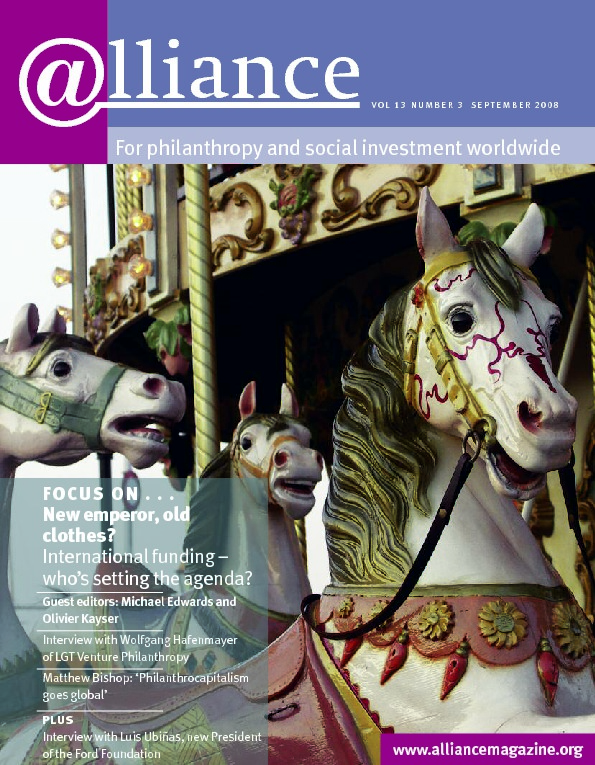 The phenomenon of ‘new philanthropy’ has seen a number of shifts in the attitudes of wealthy donors, notably the desire to see tangible impact and to become actively engaged by offering skills and expertise in addition to financial support. This has also placed growing emphasis on the role of professional advisers – lawyers, accountants, and bankers – in advising high-net-worth clients about how best to structure their philanthropic gifts to maximize the impact.
The phenomenon of ‘new philanthropy’ has seen a number of shifts in the attitudes of wealthy donors, notably the desire to see tangible impact and to become actively engaged by offering skills and expertise in addition to financial support. This has also placed growing emphasis on the role of professional advisers – lawyers, accountants, and bankers – in advising high-net-worth clients about how best to structure their philanthropic gifts to maximize the impact.
This introduces a new dimension to the relationship between donors and charities, with its own challenges and opportunities. If advisers can play the role of ‘honest brokers’ and secure the trust of both charities and donors, while utilizing their technical expertise to enhance the effectiveness of a gift, there is the potential to develop an extremely productive three-way relationship.
Fundraisers are increasingly looking to advisers as the gatekeepers to prospective major donors. Given a growing awareness of the array of options available to donors and philanthropists, it seems likely that charities will need to pay greater heed to the perceptions of donors, and perhaps offer high-level supporters more detailed reporting or even bespoke projects with clear evidence of impact. In this case, charities will need to think about how far they can go in adapting their activities to meet the wishes of a donor without jeopardizing the effective pursuit of their mission.
Discussions of donor intent often place the interests of donor and charity in polar opposition, asking whether a charity’s first question should be ‘how can this money be used most effectively?’ or ‘what did the donor intend it to be used for?’ In many cases this will be a false dilemma: donors who wish their money to be used to maximum effect will often recognize that the decision is best made by the staff and board of the charity. However, if a donor wishes to make a conditional gift that does not fit its best interests, the charity may need to consider refusing that gift – a difficult decision, especially in the current financial climate.
When an adviser is also involved, perhaps as the first point of contact between donor and charity, the dilemma facing the charity could deepen. When talking to an adviser, charities are engaging with someone who may deal with many other individual donors and charitable trusts. In this situation, can they afford to appear awkward and reluctant to fit in with the donor’s wishes? Conversely, can they be the effective, impact-focused organizations donors wish to support if their work is increasingly driven by highly targeted donations dictated by donor priorities?
This is not to paint a picture of hawkish advisers wringing concession after concession from cash-strapped charities on behalf of well-heeled clients. Rather, the potential for such a problem to arise would be structural, determined by the combined leverage of donor and adviser. This only underlines the need for charities to build effective long-term relationships with advisers who can link them to high-level donors.
If a donor meeting has been facilitated by a trusted adviser who the charity also knows well, the charity may feel comfortable that negotiation over a high-level gift can take place without alienating either donor or adviser. Far from limiting the ability of a charity to say ‘no’ to a conditional gift, the adviser’s role as an intermediary could help well-positioned charities to secure a donor’s trust, and encourage an ongoing relationship where the donor’s philanthropic intentions and the charity’s best interests can both be addressed. While there are certainly barriers to a growing role for advisers – such as the need to retain assets under management, a lack of knowledge about the charity world, and the danger of potential conflicts of interest – for many UK charities, they will represent a relatively underdeveloped opportunity for reaching high-net-worth individuals.
Ultimately, charities will seek to build a substantive relationship that reassures a donor that they can donate their money with no strings attached, and the trusted wealth adviser has a vital role to play in facilitating this. The three-way relationship between adviser, charity and donor need not be seen as a zero-sum struggle, seesawing between the good intentions of the donor, the vested interests of the adviser, and the financial needs of the charity. Rather, it represents a chance to encourage greater giving by high-net-worth individuals, by ensuring that charities are well placed to engage with and respond to wealthy donors without sacrificing their own autonomy and effectiveness.
Richard Bendell is Executive Director of EAPG, the European Association for Philanthropy and Giving (formerly the European Association for Planned Giving). Email richard@plannedgiving.org.uk





Comments (0)